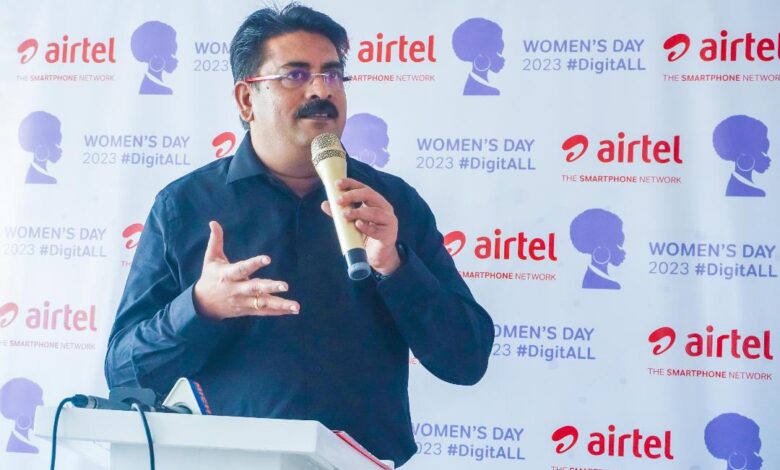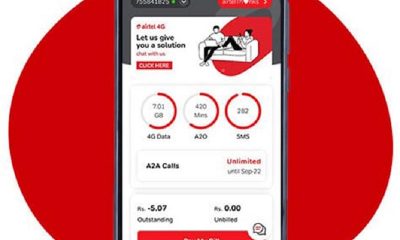Economy
Airtel Seeks NCC Support for SMEs to Drive Economic Recovery

By Adedapo Adesanya
Airtel has advocated support from the Nigerian Communications Commission (NCC) for Small and Medium Enterprises (SMEs) to stimulate economic recovery in the post-COVID-19 era.
This came as the commission reaffirmed its commitment to ensuring accelerated licensing of new spectrum that would usher in new technologies which include 5G, broadband satellite services, high altitude platform services, and others.
This assertion came at a virtual webinar organised by the Nigerian-British Chamber of Commerce (NBCC) tagged Nigeria’s Telecommunication Industry-Post COVID.
Speaking at the event, Mr Segun Ogunsanya, the Managing Director of Airtel, in his presentation, said that the SMEs were most hit by the impact of the COVID-19 pandemic and Airtel had created incentives and discounts for them to support their businesses.
This, he said, was the company’s ultimate objective to reduce the digital divide between those who have access to the internet and those who do not.
According to him, access to the internet is key and imperative because it acts as a leveller that provides information opportunities to small and big businesses alike.
Mr Ogunsanya said that contrary to conventional thinking, the telecommunications industry recorded a decline in its revenue in the first month after the lockdown.
President Muhammadu Buhari announced a total lockdown in Lagos State, Ogun and the Federal Capital Territory in March 2020 to curb the spread of the COVID-19 virus.
The said that the pandemic had transformed the conventional ways of carrying out businesses, with online engagements becoming more popular.
“The impact has been huge on social and economic activities but we thank the authorities for creating a good environment for the virus to be contained very quickly.
“The telecoms industry is not isolated from the main economy and you can see the impact on the five key areas of the GDP.
“There was an initial reduction in consumer spending on telecoms services and products and a rise in the demands for data services at the initial stage of the lockdown.
“We got a decline in the second quarter and a lot of pressure is being put on us to increase capital expenditure as a result of increased backhaul requirements,” he said.
Mr Ogunsanya urged telecommunications industries to live up to their key responsibility of creating the right access either through mobile broadband, fibre or wireless connectivity to improve the future trend of businesses in the country.
“We need both fibre and wireless because it’s slightly more difficult to leave fibre but easier to spread the wireless access.
“We have seen a shift from coverage and capacity to customer experience, but data requires a lot of bandwidth.
“We’re focusing more on the kind of experience we’re giving our customers,” he said.
Executive Vice Chairman/Chief Executive Officer of the commission, Mr Umar Danbatta, noted that “We will create additional areas of investments with the opening of new spectrum, especially for broadband deployment in both urban and rural areas, and facilitate fibre deployment through initiatives such as the information communication.
“NCC is committed to the provision of infrastructure, transparency and ease of doing business in Nigeria,” he said.
Mr Danbatta, represented by Mr Babagana Digima, Head, Digital Economy Department, NCC, added that some operators had reported an increase in data usage and volume of calls.
This had, in turn, raised the demands for better network connectivity and improved internet coverage, especially in the rural areas, he said.
He said that the telecommunications industry was committed to the delivery of better service and internet infrastructure that would provide quality service and experience as well as address customers’ complaints.
“Some of the complaints raised by the customers during the pandemic were attributed to poor mobile network signals’ absorption and low internet speed.
“The immense contribution of the telecommunications industry during this pandemic is undoubted because it has managed to keep people connected, informed, entertained and enlightened about the disease which has helped in curtailing its spread.
“Governments worldwide, especially in developing countries like ours, have since recognised the need for telecommunications’ infrastructure.
“The pandemic has laid bare the urgency of such interventions,” he said.
Also, Mrs Bisi Adeyemi, the Deputy President of NBCC, stressed the importance of the telecommunications industry on small businesses due to the evidence of more reliance on data and voice connectivity.
“People across the world have had to rely on technology to deal with the new realities of working from home.
“It has, therefore, become necessary to evaluate the impact of the industry on creating an enabling business environment and economic growth,” she said.
Economy
Why Transparency Matters in Your Choice of a Financial Broker

Choosing a Forex broker is essentially picking a partner to hold the wallet. In 2026, the market is flooded with flashy ads promising massive leverage and “zero fees,” but most of that is just noise. Real transparency is becoming a rare commodity. It isn’t just a corporate buzzword; it’s the only way a trader can be sure they aren’t playing against a stacked deck. If a broker’s operations are a black box, the trader is flying blind, which is a guaranteed way to blow an account.
The Scam of “Zero Commissions”
The first place transparency falls apart is in the pricing. Many brokers scream about “zero commissions” to get people through the door, but they aren’t running a charity. If they aren’t charging a flat fee, they are almost certainly hiding their profit in bloated spreads or “slippage.” A trader might hit buy at one price and get filled at a significantly worse one without any explanation. This acts as a silent tax on every trade. A transparent broker doesn’t hide the bill; they provide a live, auditable breakdown of costs so the trader can actually calculate their edge.
The Conflict of Market Making
It is vital to know who is on the other side of the screen. Many brokers act as “Market Makers,” which is a polite way of saying they win when the trader loses. This creates a massive conflict of interest. There is little incentive for a broker to provide fast execution if a client’s profit hurts their own bottom line. A broker with nothing to hide is open about using an ECN or STP model, simply passing orders to the big banks and taking a small, visible fee. If a broker refuses to disclose their execution model, they are likely betting against their own clients.
Regulation as a Safety Net
Transparency is worthless without an actual watchdog. A broker that values its reputation leads with its licenses from heavy-hitters like the FCA or ASIC. They don’t bury their regulatory status in the fine print or hide behind “offshore” jurisdictions with zero oversight. More importantly, they provide proof that client funds are kept in segregated accounts. This ensures that if the broker goes bust, the money doesn’t go to their creditors—it stays with the trader. Without this level of openness, capital is essentially unprotected.
The Withdrawal Litmus Test
The ultimate test of a broker’s transparency is how they handle the exit. There are countless horror stories of traders growing an account only to find that “technical errors” or vague “bonus terms” prevent them from withdrawing their money. A legitimate broker has clear, public rules for getting funds out and doesn’t hide behind a wall of unreturned emails. If a platform makes it difficult to see the exit strategy, it’s a sign that the front door should have stayed closed.
Conclusion
In 2026, honesty is the most valuable feature a broker can offer. It is the foundation that allows a trader to focus on the charts instead of worrying if their stops are being hunted. Finding a partner with clear pricing, honest execution, and real regulation is the first trade that has to be won. Flashy marketing is easy to find, but transparency is what actually keeps a trader in the game for the long haul.
Economy
Nigeria’s Stock Market Indices Shrink 0.41% Amid Panic Sell-Offs

By Dipo Olowookere
The Nigerian Exchange (NGX) Limited came under panic sell-offs on Thursday, as the investing community awaits the outcome of a probe into trading activities around one of the stocks on the bourse.
On Monday, trading in Zichis equities was prohibited by the regulator after it gained almost 900 per cent in one month of being listed by introduction on the growth board of the exchange.
This action triggered cautious trading on Customs Street, and things have not remained the same since then.
Yesterday, the key performance indices of the Nigerian bourse further depreciated by 0.41 per cent, the third straight loss this week, as investors book profit before being trapped.
It was observed that the energy industry gained 0.12 per cent and was the only one in green, as the industrial goods space shed 1.19 per cent, the banking counter depreciated by 0.63 per cent, the insurance sector lost 0.32 per cent, and the consumer goods segment tumbled by 0.03 per cent.
As a result, the All-Share Index (ASI) contracted by 802.39 points to 193,567.81 points from 194,370.20 points, and the market capitalisation decreased by N515 billion to N124.239 trillion from N124.754 trillion.
During the session, investors traded 868.5 million shares worth N31.5 billion in 69,310 deals compared with the 1.4 billion shares valued at N46.2 billion exchanged in 70,222 deals at midweek, showing a drop in the trading volume, value, and number of deals by 37.96 per cent, 31.82 per cent, and 1.30 per cent, respectively.
Jaiz Bank led the activity chart with 78.9 million equities valued at N1.2 billion, Japaul traded 73.3 million stocks worth N274.8 million, Access Holdings exchanged 66.9 million shares for N1.7 billion, Chams sold 56.9 million equities worth N239.6 million, and Zenith Bank transacted 45.5 million stocks valued at N4.1 billion.
The worst-performing stock for the day was Jaiz Bank after it lost 9.98 per cent to trade at N12.63, Ikeja Hotel declined by 9.90 per cent to N37.75, John Holt shrank by 9.90 per cent to N8.65, Enamelware slipped by 9.88 per cent to N36.50, and Cadbury went down by 9.69 per cent to N61.95.
On the flip side, FTN Cocoa was the best-performing stock after it gained 10.00 per cent to sell for N6.05, RT Briscoe improved by 9.95 per cent to N11.38, Deap Capital soared 9.92 per cent to N6.98, Japaul grew by 9.91 per cent to N3.77, and Ellah Lakes surged 9.72 per cent to N11.85.
Investor sentiment remained bearish as the exchange finished with 30 price gainers and 38 price losers, implying a negative market breadth index.
Economy
Champion Breweries Concludes Bullet Brand Portfolio Acquisition

By Aduragbemi Omiyale
The acquisition of the Bullet brand portfolio from Sun Mark has been completed by Champion Breweries Plc, a statement from the company confirms.
This marks a transformative milestone in the organisation’s strategic expansion into a diversified, pan-African beverage platform.
With this development, Champion Breweries now owns the Bullet brand assets, trademarks, formulations, and commercial rights globally through an asset carve-out structure.
The assets are held in a newly incorporated entity in the Netherlands, in which Champion Breweries holds a majority interest, while Vinar N.V., the majority shareholder of Sun Mark, retains a minority stake.
Bullet products are currently distributed in 14 African markets, positioning Champion Breweries to scale beyond Nigeria in the high-growth ready-to-drink (RTD) alcoholic and energy drink segments.
This expansion significantly broadens the brewer’s addressable market and strengthens its revenue base with an established, profitable portfolio that already enjoys strong brand recognition and consumer loyalty across multiple markets.
“The successful completion of our public equity raises, together with the formal close of the Bullet acquisition, marks a defining moment for Champion Breweries.
“The support we received from both existing shareholders and new investors reflects strong confidence in our long-term strategy to build a diversified, high-growth beverage platform with pan-African scale.
“Our focus now is on disciplined execution, integration, and delivering sustained value across markets,” the chairman of Champion Breweries, Mr Imo-Abasi Jacob, stated.
Through this transaction, Champion Breweries is expected to achieve enhanced foreign exchange earnings, expanded distribution leverage across African markets, integrated supply chain efficiencies, portfolio diversification into high‑growth consumer beverage categories, and strengthened presence in the RTD and energy drink segments.
The acquisition accelerates Champion Breweries’ transition from a regional brewing business to a multi-category consumer platform with continental reach.
Bullet Black is Nigeria’s leading ready-to-drink alcoholic beverage, while Bullet Blue has built a strong presence in the energy drink category across several African markets.
-

 Feature/OPED6 years ago
Feature/OPED6 years agoDavos was Different this year
-
Travel/Tourism10 years ago
Lagos Seals Western Lodge Hotel In Ikorodu
-

 Showbiz3 years ago
Showbiz3 years agoEstranged Lover Releases Videos of Empress Njamah Bathing
-

 Banking8 years ago
Banking8 years agoSort Codes of GTBank Branches in Nigeria
-

 Economy3 years ago
Economy3 years agoSubsidy Removal: CNG at N130 Per Litre Cheaper Than Petrol—IPMAN
-

 Banking3 years ago
Banking3 years agoSort Codes of UBA Branches in Nigeria
-

 Banking3 years ago
Banking3 years agoFirst Bank Announces Planned Downtime
-

 Sports3 years ago
Sports3 years agoHighest Paid Nigerian Footballer – How Much Do Nigerian Footballers Earn




















